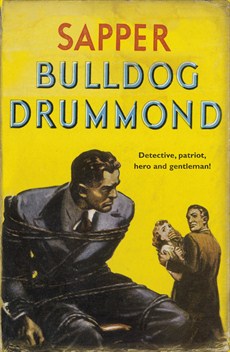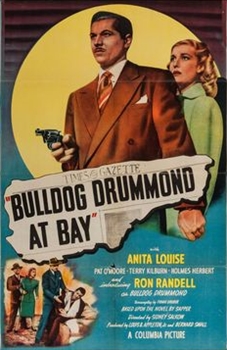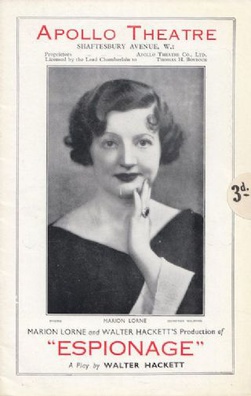Related Research Articles

Gertrude Lawrence was an English actress, singer, dancer and musical comedy performer known for her stage appearances in the West End of London and on Broadway in New York.

Hugh "Bulldog" Drummond is a fictional character, created by H. C. McNeile and published under his pen name "Sapper". Following McNeile's death in 1937, the novels were continued by Gerard Fairlie. Drummond is a First World War veteran who, fed up with his sedate lifestyle, advertises looking for excitement, and becomes a gentleman adventurer. The character has appeared in novels, short stories, on the stage, in films, on radio and television, and in graphic novels.

Herman Cyril McNeile, MC, commonly known as Cyril McNeile and publishing under the name H. C. McNeile or the pseudonym Sapper, was a British soldier and author. Drawing on his experiences in the trenches during the First World War, he started writing short stories and getting them published in the Daily Mail. As serving officers in the British Army were not permitted to publish under their own names, he was given the pen name "Sapper" by Lord Northcliffe, the owner of the Daily Mail; the nickname was based on that of his corps, the Royal Engineers.

Sir Gerald Hubert Edward Busson du Maurier was an English actor and manager. He was the son of author George du Maurier and his wife, Emma Wightwick, and the brother of Sylvia Llewelyn Davies. In 1903, he married the actress Muriel Beaumont, with whom he had three daughters: writers Angela du Maurier (1904–2002) and Dame Daphne du Maurier (1907–1989), and painter Jeanne du Maurier (1911–1997). His popularity was due to his subtle and naturalistic acting: a "delicately realistic style of acting that sought to suggest rather than to state the deeper emotions". His Times obituary said of his career: "His parentage assured him of engagements in the best of company to begin with; but it was his own talent that took advantage of them."

Bull-dog Drummond was the first Bulldog Drummond novel. It was published in 1920 and written by H. C. McNeile under the pen name Sapper. The following year it was adapted into a play of the same title starring Gerald du Maurier. In 1929, the book was adapted into a film of the same name starring Ronald Coleman.

Dear Brutus is a 1917 fantasy play by J. M. Barrie, depicting alternative realities for its characters and their eventual return to real life. The title is a reference to a line from Shakespeare's Julius Caesar: "The fault, dear Brutus, is not in our stars but in ourselves".

Bulldog Drummond at Bay is a 1947 American adventure crime mystery film directed by Sidney Salkow and starring Ron Randell for the first time as the British sleuth and adventurer Bulldog Drummond. The cast also includes Anita Louise, Patrick O'Moore and Terry Kilburn.

Hubert Willis was a British actor best known for his recurring role as Doctor Watson in a series of silent Sherlock Holmes films co-starring with Eille Norwood.

The Bat is a three-act play by Mary Roberts Rinehart and Avery Hopwood that was first produced by Lincoln Wagenhals and Collin Kemper in 1920. The story combines elements of mystery and comedy as Cornelia Van Gorder and guests spend a stormy night at her rented summer home, searching for stolen money they believe is hidden in the house, while they are stalked by a masked criminal known as "the Bat". The Bat's identity is revealed at the end of the final act.

Bulldog Drummond Strikes Back is a 1947 American adventure crime mystery film directed by Frank McDonald and starring Ron Randell, Gloria Henry and Patrick O'Moore. The film is loosely based on the H. C. McNeile novel Knock-Out.
The Barton Mystery is a 1916 play by the Anglo-American writer Walter C. Hackett. It was first performed at the Savoy Theatre in London, lasting for 165 performances. Its run in New York the following year was less successful and it closed after just twenty shows. The play mixes elements of a whodunit detective mystery with farce.

Peter Ibbetson is a play based on George du Maurier's 1891 novel of the same name. It debuted in the United States in 1917.

Audrey Hare Bicker-Caarten (1900–1977) was an actress and playwright who worked under the name of Audrey Carten.
The Outsider is a play by the British writer Dorothy Brandon. It portrays the struggle of an unorthodox medical practitioner to gain acceptance by the medical establishment. It was subsequently revised to show the unconventional triumphing over the conventional, whereas the play had originally had the opposite ending.

The Venetian is a 1931 historical play by Clifford Bax based on the story of Renaissance Italian noblewoman Bianca Cappello.
The Dancers is a 1923 play by Gerald du Maurier and Viola Tree, written under the pen name Hubert Parsons.

Espionage is a 1935 play by the British-American writer Walter C. Hackett. It is a thriller set on the Orient Express, written as a vehicle for Hackett's wife Marion Lorne. It revolves around a plot to assassinate a munitions tycoon.
Bulldog Drummond is a fictional gentleman adventurer created by H. C. McNeile.

Paddy the Next Best Thing is a 1908 romantic comedy novel by the British writer Gertrude Page.